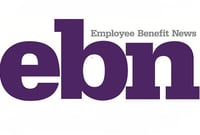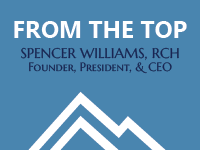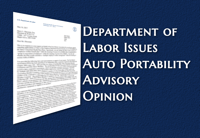
Spencer Williams
As President and CEO, J. Spencer Williams applies more than 25 years of experience in starting, building and leading businesses in the financial services industry. Under his leadership, Retirement Clearinghouse has introduced new industry best practices, been recognized for innovation, improved the operations of thousands of retirement plans, and enhanced the retirement prospects of hundreds of thousands of retirement plan participants.
-
Blog
- 401k Cash Outs
- 401k Consolidation
- 401k Plan Termination
- America's Mobile Workforce
- Assisted Roll-in
- Auto Enrollment
- Auto Portability
- Auto Portability Simulation
- Automatic Roll-In
- Automatic Rollover
- Automatic Rollovers
- Boston Research Technologies
- CARES act
- Common Mistakes
- DIY Roll-In
- DOL Advisory Opinion
- EBRI
- Employee Benefit News
- ERISA Advisory Council
- Financial Services Roundtable
- Financial Wellness
- How-To
- In-Plan Consolidation
- Leakage
- Lifetime Plan Participation
- Lost Participants
- Managed Portability
- Mandatory Distributions
- MarketWatch
- Missing Participant IRA
- Missing Participants
- National Retirement Savings Cash Out Clock
- Participant Transition Management
- PLANSPONSOR
- Portability Services Network
- PSCA
- Public Policy
- RCH Services
- Retirement Income
- Retirement Plan Portability
- retirement research
- Retirement Savings Consolidation
- Retirement Savings Portability
- Roll-In
- Safe Harbor IRA
- Saver's Match
- Security
- Small Accounts
- Stale Dated Checks
- Synthetic Tenure
- Uncashed Check Services
- Uncashed Distribution Checks
- Video
- Webcast
- What is a Missing Participant?
Consolidation Corner Blog
Consolidation Corner is the Retirement Clearinghouse (RCH) blog, and features the latest articles and bylines from our executives, addressing important retirement savings portability topics.
A Plan Metric Every Sponsor Should Track: Participant-Retained Retirement Savings

When evaluating their defined contribution plans, plan sponsors understandably look at standard benchmarks such as rate of participation, average deferral percentage, and average account balance. However, given the highly mobile nature of today’s American workforce, sponsors should also consider tracking the average percentage of retirement savings that participants retain during their job tenure, and when they leave to join another employer.
Cybersecurity is Augmented by Auto Portability

All companies that manage personal consumer data, regardless of where they are based or what industry they are part of, are right to be concerned about cybersecurity. The scope and scale of cyberattacks continue to increase around the world, as last year’s breach compromising 50 million Facebook users demonstrated.
Tax Day is Coming—Encourage Millennial Participants to Incubate Saver’s Credits

April 15 is just around the corner. While many Americans dread Tax Day, April 15 presents defined contribution plan sponsors with an opportunity to demonstrate their value as fiduciaries, and as financial wellness advocates.
5 Ways to Check if Your ARO Program Needs an Upgrade
 The long-awaited Department of Labor (DOL) guidance on the legal and regulatory framework for auto portability has cleared the way for plan sponsors to further enhance and optimize their automatic rollover programs. By explicitly recognizing auto portability’s potential benefits to retirement savers, the DOL acknowledges that existing ARO programs have flaws which auto portability can fix.
The long-awaited Department of Labor (DOL) guidance on the legal and regulatory framework for auto portability has cleared the way for plan sponsors to further enhance and optimize their automatic rollover programs. By explicitly recognizing auto portability’s potential benefits to retirement savers, the DOL acknowledges that existing ARO programs have flaws which auto portability can fix.
Want to Help Minority Participants Save More for Retirement? Adopt Auto Portability
 Much has been written about America’s retirement-savings shortfall. Much has also been written about one of the major reasons for this shortfall—the lack of technology and operating standards to make seamless plan-to-plan savings portability easy for America’s highly mobile workforce. The cumbersome and costly nature of DIY portability has made prematurely cashing out small-balance 401(k) savings accounts, or stranding them in former employers’ plans, the easiest options for many participants after they change jobs.
Much has been written about America’s retirement-savings shortfall. Much has also been written about one of the major reasons for this shortfall—the lack of technology and operating standards to make seamless plan-to-plan savings portability easy for America’s highly mobile workforce. The cumbersome and costly nature of DIY portability has made prematurely cashing out small-balance 401(k) savings accounts, or stranding them in former employers’ plans, the easiest options for many participants after they change jobs.
Sidecar Accounts Can Plug Some 401(k) Leakage—But Not Most Leakage
 “Not having enough emergency savings for unexpected expenses” is the No. 1 financial concern for Millennials and members of Generation X, and the No. 2 financial concern among Baby Boomers, after retirement security. These findings from a PwC Employee Financial Wellness Survey released last year shouldn’t surprise members of the retirement services industry, since too many defined contribution plan participants dip into their 401(k) savings—through loans, hardship withdrawals, or cash-outs upon changing jobs—to fund emergency expenses.
“Not having enough emergency savings for unexpected expenses” is the No. 1 financial concern for Millennials and members of Generation X, and the No. 2 financial concern among Baby Boomers, after retirement security. These findings from a PwC Employee Financial Wellness Survey released last year shouldn’t surprise members of the retirement services industry, since too many defined contribution plan participants dip into their 401(k) savings—through loans, hardship withdrawals, or cash-outs upon changing jobs—to fund emergency expenses.
Auto Portability is Like Bacon—It Makes Everything Better
 When auto enrollment was widely adopted under the Pension Protection Act of 2006, it was a well-intentioned idea for helping Americans save more for retirement.
When auto enrollment was widely adopted under the Pension Protection Act of 2006, it was a well-intentioned idea for helping Americans save more for retirement.
But in this case, what seemed like the perfect recipe for increasing retirement savings for hardworking Americans was missing a key ingredient.
Department of Labor Issues Auto Portability Advisory Opinion
 The Department of Labor (DOL) has issued its 11/06/18 Advisory Opinion 2018-01A on Auto Portability, which can be accessed on the DOL’s website at this link.
The Department of Labor (DOL) has issued its 11/06/18 Advisory Opinion 2018-01A on Auto Portability, which can be accessed on the DOL’s website at this link.
Is Your Missing-Participant Program a Ford Model T or 2018 BMW?
A primary responsibility for fiduciaries is to seek out and identify the best available solutions that enable fulfillment of their responsibilities. For plan sponsors tasked with implementing and evaluating the effectiveness of their missing participant program, this can be a difficult task, particularly given the accelerating rate of technological innovation and the virtual explosion of new sources of data available online. In today’s day and age, what is considered a state-of-the-art program today could easily become obsolete tomorrow, rendering a plan’s missing-participant program vulnerable to fiduciary liability.
The Next Big Advancement for the 401(k)
Although the 401(k) is today the primary retirement-savings vehicle for many hardworking Americans, it can be easy to forget that the 401(k) is still a relatively new phenomenon.
-
Blog
- 401k Cash Outs
- 401k Consolidation
- 401k Plan Termination
- America's Mobile Workforce
- Assisted Roll-in
- Auto Enrollment
- Auto Portability
- Auto Portability Simulation
- Automatic Roll-In
- Automatic Rollover
- Automatic Rollovers
- Boston Research Technologies
- CARES act
- Common Mistakes
- DIY Roll-In
- DOL Advisory Opinion
- EBRI
- Employee Benefit News
- ERISA Advisory Council
- Financial Services Roundtable
- Financial Wellness
- How-To
- In-Plan Consolidation
- Leakage
- Lifetime Plan Participation
- Lost Participants
- Managed Portability
- Mandatory Distributions
- MarketWatch
- Missing Participant IRA
- Missing Participants
- National Retirement Savings Cash Out Clock
- Participant Transition Management
- PLANSPONSOR
- Portability Services Network
- PSCA
- Public Policy
- RCH Services
- Retirement Income
- Retirement Plan Portability
- retirement research
- Retirement Savings Consolidation
- Retirement Savings Portability
- Roll-In
- Safe Harbor IRA
- Saver's Match
- Security
- Small Accounts
- Stale Dated Checks
- Synthetic Tenure
- Uncashed Check Services
- Uncashed Distribution Checks
- Video
- Webcast
- What is a Missing Participant?
